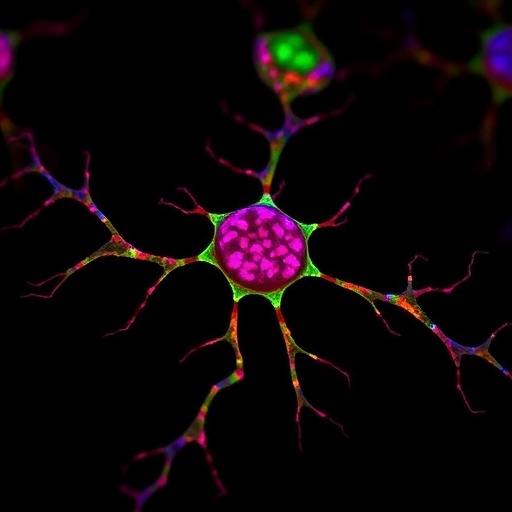In a pioneering study spearheaded by a team at the Washington University School of Medicine in St. Louis, significant advancements are being made in our understanding of the genetic landscape of cancer. For years, the primary focus of cancer genome research has revolved around mutations found within tumor cells, elements that foster unchecked growth and malignancy. However, this groundbreaking research shifts the spotlight onto inherited cancer mutations that can be detected in healthy blood samples. This innovative approach opens the door to a new perspective on cancer predisposition, suggesting that the seeds of cancer risk could be planted right from birth.
The research, involving more than 1,000 cancer patients, delves into the role of germline variants—mutations that are passed down from one generation to the next. By analyzing how these inherited genetic alterations impact protein function and cellular physiology, the team provides insights that may help to elucidate why certain individuals develop cancers at various points in their lives. The implications of this work are vast, with potential applications in cancer risk assessment, prevention strategies, early detection methods, and novel treatments.
Published in the prestigious journal Cell, this study represents a significant milestone within the Clinical Proteomic Tumor Analysis Consortium. This consortium is a nationwide initiative backed by the National Cancer Institute under the National Institutes of Health, dedicated to mapping out the roles of cellular proteins in cancer progression. This research underscores the importance of distinguishing between inherited germline variants, which a person is born with, and the spontaneous mutations that occur in tissues throughout life.
One of the study’s notable contributions is the identification and analysis of 119 rare, cancer-associated genetic variants among the participants. These variants, which have been shown to affect the stability, structure, and abundance of essential proteins, encompass both rare mutations with known associations to cancer and common variants that, in aggregate, could heighten an individual’s cancer risk. This dual focus moves beyond the traditional scope of inquiry that primarily centered on high-profile genetic mutations, such as those in the renowned BRCA genes linked with breast cancer.
The research team, including first author Fernanda Martins Rodrigues, PhD, emphasizes the novelty of their findings. By incorporating common genetic variants into their analysis, they reveal a more nuanced picture of cancer predisposition that may disrupt critical biological pathways even when individual mutations do not appear to confer a significant risk on their own. This approach highlights the impact of polygenic risk scores, which estimate an individual’s overall risk for developing cancer based on the cumulative effect of multiple mutations.
Results of the study indicated that patients diagnosed with aggressive forms of cancer, such as glioblastoma, pancreatic cancer, and certain lung cancers, exhibited markedly higher polygenic risk scores compared to healthy individuals or those with other less aggressive cancer types. This correlation suggests that the complexity of inherited genetic factors is a crucial component of tumor behavior and disease aggressiveness, potentially shaping treatment strategies tailored to individual genetic backgrounds.
As the researchers examined the downstream effects of inherited genetic variants on protein function, they discovered that these numerous mutations converge on shared biological processes. This led to insights into how inherited mutations can engender structural changes to proteins after their synthesis, significantly influencing their functional capacity within the cellular environment. These factors can determine the timing and location of protein activity, underscoring the sophistication of cellular regulation and its implications for disease.
The methodology employed in this research sets a new standard by drawing connections between genome sequencing data and the functional ramifications of genetic alterations on proteins. This represents a critical leap forward, as traditional genome sequencing might overlook the nuanced effects of these modifications, revealing the intricate relationship between our genetic makeup and cancer vulnerability.
By expanding the framework that defines inherited cancer risks, this study not only elevates our understanding of cancer biology but also paves the way for improved precision in cancer prevention and management. The implications for individual patients could be substantial, better informing healthcare professionals of the tailored interventions available to mitigate cancer risk based on one’s specific genetic profile.
Dr. Li Ding, a prominent figure in this research, articulates the significance of the findings, asserting that “understanding how germline variants — both rare and common — influence the protein machinery of our bodies is foundational for grasping the complexities of cancer development throughout a person’s life.” This research underscores the urgency of integrating genomic insights with clinical practice to enhance patient care and outcomes.
As further research emerges from initiatives like the Clinical Proteomic Tumor Analysis Consortium, it is anticipated that our comprehension of cancer and its myriad influences will continue to deepen. The intersection of genomic research and clinical oncology holds the promise for revolutionary advancements in how we approach cancer prevention, screening, and treatment.
This study invites stakeholders across fields, including clinicians, researchers, and genetic counselors, to reconsider how inherited genetic information can be utilized within a clinical framework. By acknowledging the layered interplay of both inherited and acquired mutations, there lies an opportunity to refine risk assessments and develop targeted therapies that reflect the specific genetic and biological landscape of individual patients.
To conclude, the insights gained from this comprehensive analysis signify not just a step forward in cancer research but potentially a transformative avenue that will inform future generations of cancer treatment and prevention strategies. As science continues to peel back the complexities of the genome, the road ahead is one filled with hope and the promise of personalized medicine that truly addresses the unique genetic architectures of individuals at risk of cancer.
Subject of Research: Inherited cancer mutations and their impact on cellular proteins and cancer risk.
Article Title: Precision proteogenomics reveals pan-cancer impact of germline variants.
News Publication Date: 14-Apr-2025.
Web References:
References:
Image Credits:
Keywords: cancer risk, germline mutations, personalized medicine, proteomics, polygenic risk score, cancer prevention, cancer biology, inherited variants.




